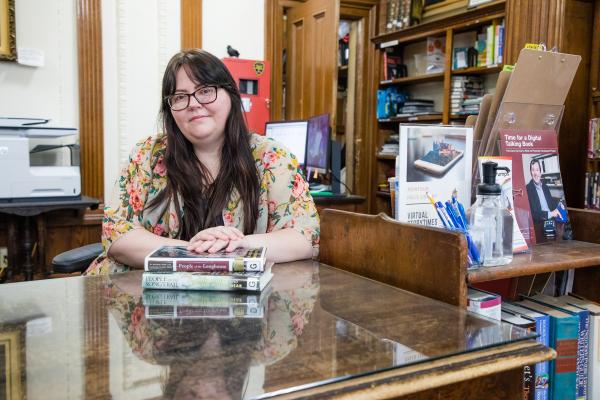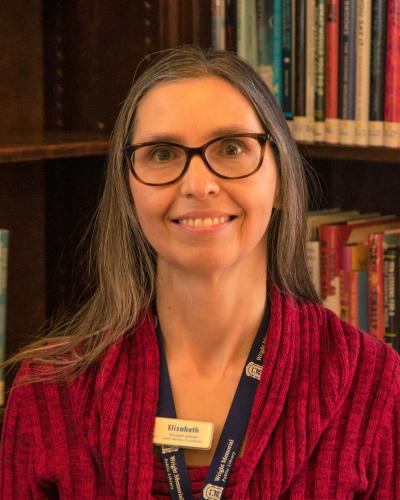It’s easy to imagine a successful program as a packed Zoom call or large outdoor gathering — but major change doesn’t necessarily require major turnout.
Through ALA's Libraries Transforming Communities (LTC): Focus on Small and Rural Libraries initiative, libraries engage their small communities in discussion around issues that matter. Here are the stories of two libraries whose programs started small.
“Not every conversation is a superstar” — And that’s OK!
Montour Falls Library, in rural Schuyler County, New York, has hosted cooking and art classes, concerts, donation drives and more for years. But when Assistant Director Kelly Povero planned out a series of book discussions around social justice topics, the community seemed less ready to engage. After the first two sessions went by with only library staff in attendance, the third — focused on the book “Men Who Hate Women” by Laura Bates — had one person show up. However, Povero said she was able to have a “really great conversation” with this visitor, who had found the book eye-opening and gained a new awareness that extreme misogyny “was something we needed to be concerned about.”

During the discussion, the attendee described how they had brought the book, with its attention-grabbing title, to lunch with friends and carried it around outside, exposing others in the community to the topic. Povero expressed hope that “even if they didn't read it or come to the book club, maybe they talked about it.”
She also pointed out that there were people who didn’t come to book discussions but probably did do the reading. While a total of 11 people came to Povero’s conversation series between March and July, the books the discussions were planned around were checked out a total of 77 times. While this may seem low to librarians serving larger communities, it is significant for the four Schuyler County libraries Povero purchased these books for.
Povero notes that past programs her library has run also took time to get off the ground: “We’ve had programs that you see very little interest in for almost a year, and then all of a sudden, people start realizing it’s there.”
Focusing on the “who” — not the “how many”
Elizabeth Schmidt, of Wright Memorial Public Library in Oakwood, Ohio, has been involved with LTC since 2018 and has seen firsthand the change libraries can facilitate. The library's Let's Talk series focuses on a variety of topics including racism, voting, and Second Amendment rights. The series has been received very positively and has established the library as a leader in the community, to the extent that the library became one of the founding members of the newly formed Oakwood Inclusion Coalition.
However, while some events have had a high turnout, Schmidt explains that “so many conversations were like, you know, three people, or four people or one person.” Similarly to Povero, she sees these events as meaningful to the people who did attend, and to the community as a whole in raising awareness. "Just the fact that we are offering the conversation and promoting it in the newspaper and on Facebook makes people aware that the library is a place to engage with people and ideas," she says.

Schmidt recently held a series of events focused on rethinking the typical suburban lawn as discussed in "Nature’s Best Hope" by Douglas Tallamy. As Oakwood is a suburban area where residents care about their lawns, the library was already established as an influential part of the community, and the book discussion had been promoted heavily in local news and on social media, Schmidt expected a high turnout. However, only 12 people attended, including three library staff.
After her initial disappointment, though, Schmidt realized that the people who did attend had the power to affect wider change in the community. One person had been growing native species in their yard for seven years and was eager to share their experience with others. There were also representatives of Green Oakwood, a large Facebook group focused on sustainability, and of the Oakwood Beautification Committee, which gives out awards to the most beautiful yards in the community.
Community awareness produces a ripple effect
Despite lower-than-expected attendance at the initial book discussion, follow-up events — including a virtual author visit and a yard tour organized with one of the book discussion attendees — drew much larger audiences. Schmidt thinks this may be partly due to the different modes of participation involved. “Maybe people didn't want to talk about it, they wanted to learn about it,” she says. Like Povero, Schmidt pointed out how the community was exposed to the themes of the book through borrowing it themselves, or even simply through the library’s promotion.
She also observed the power of word-of-mouth communication for spreading the topic to a wider audience, giving examples of two separate occasions someone she knew had heard another community member bring up the library’s “Nature’s Best Hope” programming in casual conversation.
Schmidt continues to plan events around biodiversity and sustainability, and the Green Oakwood group involved since the initial book discussion has recently launched a citizens’ group to educate and advocate for change in the community.
At both libraries, efforts that started small have created a ripple effect as community awareness of the library’s efforts grows.
Key Takeaways
- Which people attend an event can be more important than how many people attend.
- Organizing programming around an issue spreads awareness — even if no one shows up to the program itself. Engagement comes in many forms.
- Change sometimes starts slowly. Give programs time to gain momentum.
Knology is a nonprofit research organization that produces practical social science for a better world. The organization pursues this goal to help professionals in a variety of sectors build inclusive, informed, and cooperative societies that can thrive together with the natural systems on which we all depend. As a transdisciplinary collective of over 30 social scientists, writers, and educators, the organization's work process is built on equity, transparency, and deliberation.



